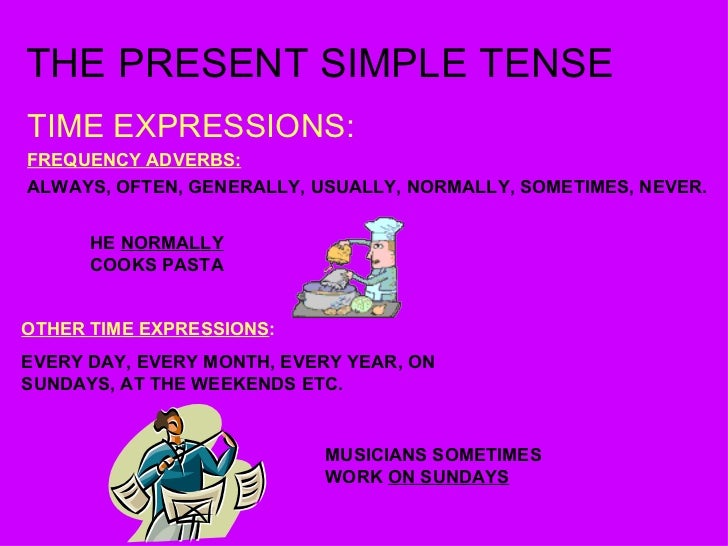The Simple Present Tense: Talking about Likes and Dislikes
1) We use the simple present tense to talk about things we like or people like.
Example:
I like Pizza.
Brianna likes dogs.
Javier likes Maroon 5.
2) we use the simple present tense to talk about activities we enjoyr doing.
example:
I like swimming.
she likes cooking.
juan likes camping.
The table below explains how to make sentences about things people like, using the simple present tense.
3) we use the simple present tense to talk about things or activities we do not like. we use don't instead of do not when you speak, and for informal writing.
Examples:
I don't like sushi.
They don't like running.
4) we use doesn't like with third person singular (he, she or it )
Examples:
She doesn't like oranges.
Julián doesn't like dancing.
The table below shows how make negative sentences using the simple present tense.
1. Use of the Simple Present
1.1. Repeated actions
My friend often draws nice posters.1.2. Things in general
The sun rises in the east.1.3. Fixed arrangements, scheduled events
The plane flies to London every Monday.1.4. Sequence of actions in the present
First I get up, then I have breakfast.1.5. Instructions
Open your books at page 34.1.6. With special verbs
I understand English.2. Signal words
- every day
- often
- always
- sometimes
- never
3. Form
infinitive (3rd person singular he, she, it: infinitive + -s)4. Examples
Affirmative sentences in the Simple Present| Long forms | Contracted forms |
|---|---|
| I read books. | not possible |
| You read books. | |
| He reads books. |
Negative sentences in the Simple Present
You must not negate a full verb in English. Always use the auxiliary do for negations and the infinitive of the verb.
| Long forms | Contracted forms |
|---|---|
| I do not clean the room. | I don't clean the room. |
| You do not clean the room. | You don't clean the room. |
| He does not clean the room. | He doesn't clean the room. |
4.3. Questions in the Simple Present
You need the auxiliary do/does and the infinitive of the verb.| Long forms | Contracted forms |
|---|---|
| Do I play football? | not possible |
| Do you play football? | |
| Does he play football? |
5. Questions without question words in Simple Present
| Auxiliary | Subject | Verb | Rest | Yes/No | Subject | Auxiliary (+ n't) |
||||
|---|---|---|---|---|---|---|---|---|---|---|
| Do | you | read | books? | Yes, No, |
I I |
do. don't. | ||||
| Does | Peter | play | football? | Yes, No, |
he he |
does. doesn't. |
6. Questions with question words in Simple Present
| Question word | Auxiliary | Subject | Verb | Rest | Answer |
|---|---|---|---|---|---|
| What | do | you | play | on your computer? | I play games on my computer. |
| When | does | your mother | go | to work? | She goes to work at 6 o'clock. |
| Where | do | you | meet | your friends? | I meet them at the bus stop. |











